Censorship in the People's Republic of China is mandated by the PRC's ruling party, the Chinese Communist Party (CCP). It is one of the strictest censorship regimes in the world.
The authorities censor content practically in all media platforms that are capable of reaching a wide audience.
This includes television, print media, radio, film, theater, text messaging, instant messaging, video games, literature, and the internet.
The Chinese government insists that it has the legal right to control the content within its territory. The government believed its censorship rules did not infringe on its citizens' right to free speech.
Government officials have access to uncensored information via an internal document system.
Even Sina Weibo, the largest and most popular social networking site in mainland China, has an internal censorship department that issues its own directives in line with government authority requirements and employs its own censors to monitor content.
Weibo censorship department detailed its methodology: "Sina's computer system scans each post using an algorithm designed to identify politically unacceptable content".
Weibo posts that are found to be violating the rules are flagged by the algorithm and forwarded to the department's employees, who decide their fate based on the instructions listed in the censorship logs.
As they envisioned a healthier society that preserved cultural norms, state regulators banned or restricted certain drama themes on moral grounds:
- BL (boy's love), same-sex relationships
- LGBTQ, Pornography
- Time Travel, Reincarnation
- Extravagance, Hedonism
- Cleavage exposure, nudity
- Sissy men
We will tackle each of the banned and restricted theme below:
1. BL or boy's love/Same-sex relationship
BL means boy's love which denotes a romantic feeling between men, in other words same-sex relationship. The ban on BL-themed dramas began in 2016, weeks after the broadcast of Addicted, the acting debut of Johnny Huang and Timmy Xu.
 |
| Johnny Huang and Timmy Xu in Addicted (2016) |
Addicted premiered on January 29, 2016, but weeks after its broadcast, on February 23, 2016, it was taken down at the order of Chinese authorities. Addicted was on its 15th episode when it was slapped with a ban.
Surprisingly, it was remade in 2023 (Stay With Me) with the male characters' relationship altered into just "bromance". But it was not shown in China. It's only available for streaming outside the mainland, including the currently airing "Unknown" on Youku.
On February 27, 2016, during the annual meeting of the national TV drama industry, the following principles for censorship of web series were announced:
“Self-censorship will still be enforced for content broadcast on video sites, however, the censorship standards for web dramas and TV dramas must be unified, and what cannot be broadcast on TV also cannot be broadcast online".
On June 30, 2016, the China Association of Network Audiovisual Program Services issued the General Rules for Reviewing the Content of Network Audiovisual Programs, which classifies homosexuality as an abnormal sexual relationship, vulgar, pornographic, and obscene.
The rules stated that content containing expressions of homosexuality must be removed before broadcast. If the problem is serious, the entire program should not be broadcast.
Since then, adding female protagonists or altering the BL theme to the storyline of love between a male and a female became a temporary solution but has resulted in fan protests for changing the original concept of the novels.
So in 2018, the strategy of changing romantic narratives to just “bromance” or the so-called pure friendship between men, became a norm on web dramas that are adapted from BL novels.
Authorities imposed the following criteria for dramas that are adapted from BL novels, to pass censorship:
- Intimate physical actions between men such as kissing and caressing should be removed.
- Dialogues reflecting intimate feelings in relationships between men should be altered to dialogues as pure friends only.
- Eye and facial expressions and physical gestures insinuating romantic and sexual attraction between male characters should be removed.
- A heterosexual storyline involving the female supporting characters should be added.
The above criteria were applied by writers to the script of The Untamed (2019) and Word of Honor (2021) which proved to be successful.
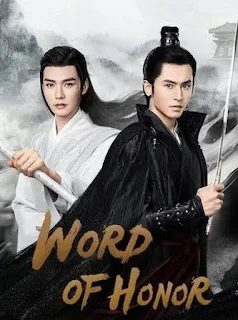 |
| Gong Jun and Zhang Zhehan in the hit costume drama, Word of Honor (2021) |
The Untamed and Word of Honor both used a strategy of mouthed words, but they received criticism because the movement of the characters' mouths did not match the dubbing due to the replacement of lines just to pass censorship.
Despite altering the scripts, The Untamed and Word of Honor still encouraged the audience to fantasize about male-male love.
So after the release of Word of Honor in 2021, authorities declared a "boycott" on BL dramas because, despite the heavy censorship, the story still insinuates romance between the two male characters.
The controversy in 2021 when a fan-made series featuring the characters of Xiao Zhan and Wang Yibo in The Untamed as lovers made its way online, became the last straw that broke the camel's back.
Authorities thought they'd had enough, so BL drama adaptations must be ultimately banned. After the broadcast of Word of Honor in 2021, the censor board refused to give approval to succeeding BL-themed dramas.
It followed with the launch of Operation Qinglang, a nationwide campaign aimed at creating a “clear and bright” internet environment, by the country’s internet watchdog, the Cyberspace Administration of China (CAC).
As Operation Qinglang evolved into a long-lasting censorship mechanism targeting various online activities in the country, BL dramas, most of which are adaptated from BL novels, fell under scrutiny.
 |
| Luo Yunxi and Arthur Chen in Immortality, which may never be shown anymore unless the producers change the tone of the script and resubmit the drama for review |
Labeled by officials as a form of “vulgar culture,” the BL genre was lambasted in the summer of 2021 by a party newspaper Guangming Daily, as a kind of drama genre that has “negative impact on teenagers.”
In September 2021, the National Radio and Television Administration (NRTA), which controls broadcast media and also has the power to regulate online audio and video, held a conference in Beijing to condemn BL adaptations and highlight the alleged problems inside fandom communities formed around BL drama.
 |
| Chen Xingxu and Chen Muchi in Guardians of the Land, a BL drama. They appeared together in "The Starry Love" (2023) but with female partners |
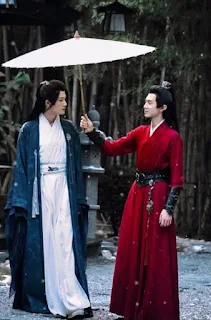 |
| Tan Jianci and Chen Zheyuan in Winner is King |
The question of whether NRTA will lift the ban on BL dramas or not was finally answered in 2023 when an executive of a popular streaming platform reportedly said that all BL dramas will be permanently banned and will never be given a license to air. Ever again.
So, this means the following series adapted from BL novels will forever be shelved unless the productions change the screenplay:
- Eternal Faith - Zhang Linghe and Zhai Xiao Wen
- Immortality - Luo Yunxi and Arthur Chen
- Guardians of the Land - Chen Xingxu and Chen Muchi
- Winner is King - Tan Jianci and Chen Zheyuan
2. LGBTQ and Pornography
Content censored on moral grounds has included pornography in China, particularly extreme pornography; violence in films; "low-culture" and morally "problematic" performances, such as hip-hop or those featuring visibly tattooed artists and LGBTQ content on television.
Pornography has been illegal since the founding of the People's Republic in 1949 and is a major target of censorship, but it is still commonly accessible within the country through other means.
Censorship bodies generally treat LGBT content as immoral and regularly censor non-pornographic depictions of such content in mass media.
Positive depictions of same-sex relationships in movies and television have been taken off the air by censors, and according to Human Rights Watch, negative depictions of LGBTQ people have been "common and pervasive" since 2015.
Global controversy erupted in 2018 when Mango TV edited out Ireland's Eurovision song because it depicted two men holding hands and dancing together.
An LGBT flag waved during an earlier performance by Switzerland that year was also blurred out. The European Broadcasting Union subsequently terminated its relationship with Mango TV's parent company, Hunan Broadcasting System.
3. Time Travel, Rebirth/Reincarnation
In 2011, following the airing of Scarlet Heart (starring Liu Shishi and Nicky Wu) and Palace (starring Yang Mi and Feng Shaofeng), which followed the theme of time travel (both tell the story of a modern woman transmigrating into the Qing dynasty period), Chinese authorities banned time travel in films and television because it disrespects history.
The rationale for this ban is that whatever is not possible in the real world belongs to superstition, said film critic and journalist, Raymond Zhou Liming, and a superstition theme in a non-xianxia drama is considered misleading and bizarre.
Authorities believed the idea of time travel presents a clear danger of altering facts and history, they said: "Producers and writers are frivolously treating serious history".
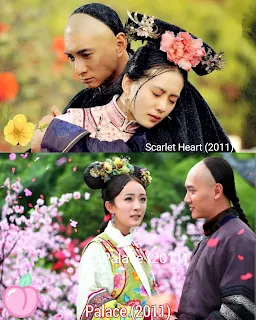 |
| Liu Shishi and Nicky Wu in Scarlet Heart, and Yang Mi in Palace |
According to Hollywood Reporter, China's ruling party based much of its doctrine and strict media management on scientific Marxism (based on the principles propagated by German socialist, Karl Marx) that the fantasy of time travel - which potentially gives the individual the freedom to reorder reality - conflicts with politically correct thought followed by the Communist Party of China.
According to regulators, time travel is often used in blatant, “frivolous” disregard of the importance of past events.
In doing so, the fictionalized dramas cause the viewers to reinterpret their relationship with past events, which can set the stage for the spread of forbidden ideas or a lack of reverence for one’s history.
Therefore, they argued, programs that depict an irresponsible use of time travel and rebirth for entertainment purposes (even if it's fiction) are attracting negative values and incorrect ideals, contradicting reality, and, therefore must be banned.
The government says TV dramas should not have characters that travel back in time and rewrite history, as it goes against Chinese heritage, according to the reports of CNN's Eunice Yoon. They also said that myth, superstitious, and reincarnation themes are all questionable.
New guidelines issued in 2023 discourage plot lines that contain elements of "fantasy, time-travel, random compilations of mythical stories, bizarre plots, absurd techniques, even propagating feudal superstitions, fatalism (the belief that all events are predetermined and therefore inevitable), reincarnation, rebirth, ambiguous moral lessons, and a lack of positive thinking."
The potential of altering past-future events and destroying the very fabric of space-time prompted authorities to forever ban time travel and rebirth dramas.
This ban, however, did not include dramas in the xianxia genre whose story is pure fantasy based on mythology, Chinese folklore, Taoism, and ancient beliefs.
Rebirth/reincarnation is still a sensitive topic to be discussed in China due to the Chinese government's clash with Tibet's Dalai Lama whose culture is all about reincarnation.
Xi's government insisted they will take part in the approvals of the Dalai Lama reincarnation which didn't set well with Tibet. State drama regulators however didn't specify if the ban of rebirth dramas has something to do with the government's conflict with Dalai Lama.
But time travel and rebirth novels still continue to be adapted into web and TV series with screenwriters applying tricks to the script to pass censorship.
Some examples:
- Joy of Life (2019) was supposed to be a time travel drama with the male lead character transmigrating back in time, but the script of the drama was altered and made the male character just a character in the novel.
- Untouchable Lovers (2017) has removed the modern arc, instead of the modern-day woman transmigrating into the body of a princess during the Song dynasty, she was re-written as the twin sister of the princess abandoned at birth.
- Scent of Time (2023) made the female character fall into a coma instead of transmigrating into the character in the book she was reading.
- Story of Kunning Palace (2023) made the female character a modern woman writing a book instead of being reborn after she died. Same plot as An Ancient Love Song where the main male character is a modern-day writer and while he falls asleep he dreams of going back to the time of the setting of his novel and meets the main character of his story.
- Yong An Dream (2024) also altered the flow of the story, instead of rebirth, the main male character just experiences a recurring dream about the female character.
- Legend of the Female General (Zhou Ye and Cheng Lei)
- Female Assassin of the Song Dynasty (Wang Churan and Li Hongyi)
- The Princess Royal (Zhao Jinmai and Zhang Linghe)
4. Extravagance/Hedonism
It is unclear if extravagance and hedonism (pursuit of pleasure and sensual self-indulgence) have been added to banned themes in the drama, but in 2018, Story of Yanxi Palace and Ruyi's Royal Love in the Palace suddenly disappeared from television programming in mainland China after these dramas were called out for their "sins.”
The reason? Authorities claimed that these dramas promote extravagance and hedonism, thus perceived to be promoting "negative values".
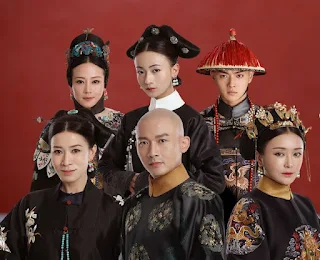 |
| Story of Yanxi Palace (2018) |
Following the disappearance of Story of Yanxi Palace and Ruyi's Royal Love in the Palace in the schedules of local television, the Beijing Daily magazine reported in 2018 that some imperial dramas encouraged viewers to pursue the glamorous lifestyles of China’s past monarchs and promoted pleasure and luxury above the “virtues of frugality and hard work”.
The article singled out several period dramas, including Story of Yanxi Palace and Ruyi's Royal Love in the Palace, and said a close following of the plots of these series – which usually involve elaborate schemes hatched by back-stabbing courtiers – would upset the “balance” of society.
5. Cleavage exposure, nudity
In 2014, the big-budgeted historical costume drama, The Empress of China, starring Fan Bingbing earned the moniker, "The Saga of Wu's Breasts", after it was pulled out a few days after it premiered on Hunan TV due to "technical reasons."
The technical reasons appeared to be "re-editing" the whole drama, cropping the scenes of frontal shots of cleavage. When it resumed airing, the boobs scenes were either cropped or blurred.
Nudity has always been a troublesome topic for Chinese censors, and extreme lengths are often required to protect public morality.
6. Sissy men (meaning trying to appear and look girly)
As if tons of bans are not enough, state regulators also took notice of men appearing girly and decided it should be banned too. 😂
This censorship, which overseas fans might consider weird, means to preserve the government's fragile sexual state, decreeing that China's male celebrities are harming the populace by being too girly.
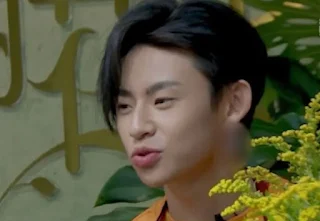 |
| A male contestant in the Chinese reality show "Little Sister's Flower Shop" is seen with an ear lobe blurred due to his earrings. |
To avoid issues with authorities, web shows and television shows will blur the earlobes of men who are wearing earrings or have tattoos.
Male actor's earrings, ponytails, and tattoos are perceived to be rebellious and culturally inappropriate by the Chinese authorities.
In 2021 the National Radio and TV Administration added a ban on "sissy men and other abnormal aesthetics" to its rules using the offensive term Niang Pao, which literally means "girly guns".
It reflects officials' concern that Chinese pop stars, influenced by the girlish look of some South Korean and Japanese pop singers and actors, are failing to encourage China's young men to be masculine enough.
The regulators said broadcasters should avoid promoting "vulgar internet celebrities" and admiration of wealth and celebrity.
Instead, programs should "vigorously promote excellent Chinese traditional culture, revolutionary culture, and advanced socialist culture."
Those who "violate public order" or have "lost morality" must be reprimanded or even banned from appearing in any shows.
China’s media regulator banned TV stations from featuring actors with tattoos. Depictions of “hip hop culture, sub-culture, and immoral culture,” were also banned according to Chinese state media.
Grace Leung, a professor at the Chinese University of Hong Kong’s School of Journalism and Communications, said the decision to blur earrings and tattoos is likely influenced by the government’s desire to minimize Western impact in China’s pop culture.
“This is a consistent policy of purifying their pop culture from the Western influence and strengthening the Chinese characteristics of manhood,” Leung, who teaches media regulation and policy issues, told CNN in an email.
With all these bans and so many restrictions, content creators, writers, and drama producers left a little room to freely explore literary topics.
Nonetheless, Chinese dramas from the mainland saw increasing demands overseas and their popularity continues to rise, rivaling Korean series in the region despite the heavy censorship from the authorities.











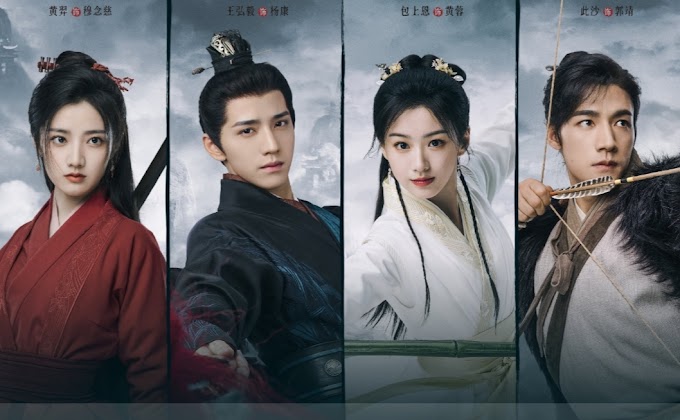



1 Comments
Pues la censura hace que los directores y guionistas busquen otros medios y resulta q funciona ningún BL Tailandés,koreano o japonés le llega a los talones a The Untamed o Word of honor y con censura incluida. Siento que esos cambios que se deben forzar debido a la censura no tienen el efecto q esperaría el gobierno,.
ReplyDelete